
THE emergence of the Simba Makoni “initiative/project” has raised justifiable questions about the direction of the continuing quest by Zimbabweans to end the dictatorship of the ZANU-PF regime and usher in a genuinely democratic dispensation.
One such question is: how should civic society relate to the initiative? More fundamentally, should it be the business of civic society organisations to pronounce their preferences among contesting presidential aspirants?
I have decided to take a few hours from my activist work and put pen to paper to address some of the pertinent issues arising from the Makoni “initiative/project”.
In doing this, I am neither wearing the hat of an academic nor putting on the spectacles of the proverbial analyst. I am here articulating the views of a civic society activist who, since 1997, has been part of a movement that has certain beliefs, values and principles.
Accordingly, the views and positions expressed herein are partisan in that they are controlled by the beliefs, values and principles for which I have been an activist in the past 10 years.
The starting point is to put my cards on the table. Based on the values and beliefs of the movement I belong to, the Makoni “initiative/project” is fundamentally misconceived. It will fail. It has no grassroots support. It misunderstands the nature of the responses required to address our deepening political crisis.
The founding stone of the initiative is the March 29 harmonised election. The planners believe that on March 29, Makoni will capture power from President Robert Mugabe through an electoral process presided over by none other than the President himself.
To them, the reason why President Mugabe is still in power is because those who have challenged him in previous elections did it prematurely and lacked the requisite credentials, support and strategies.
The time has now come, a person with the requisite credentials has been found and the support from appropriate circles is also available. According to them, President Mugabe is a democrat who respects electoral processes and will hand power to whoever is elected on March 29.
Makoni and his backers believe that peaceful street protests, stay aways and grassroots meetings advocating fundamental reforms such as a new, democratic and people driven constitution are inappropriate and misguided. All that matters is a carefully planned electoral strategy that “ambushes” (President) Mugabe and takes power away from him through the ballot.
The response to this approach is simple: the March 29, elections are being conducted under a defective constitution whose raison d’etre is to preserve the status quo. Elections under the current constitution cannot deliver change whatever the credentials of the contestants and however sophisticated their strategies.
Until Zimbabweans put their energies together and push the current regime to embrace a genuine and people-driven reform process that leads to a democratic constitution, power will not change hands through a mere election. Participation in the elections on March 29 cannot be for the purpose of winning power. It can only be for any other good reasons.
This brings me to the question of the day: if power cannot change hands under the current constitution, why are all major civic groups, including the National Constitutional Assembly (NCA), urging people to go and vote on March 29?
Different civic groups may have different reasons for urging people to go and vote. For the NCA, March 29 will not deliver a new President but it provides a platform for Zimbabweans to make a statement against the Mugabe regime’s sins, which include being the author of the suffering of the people and above all, its refusal to embrace democratic reforms.
Casting a vote against (President) Mugabe on March 29 is a peaceful protest against dictatorship and a key step in the post election agenda of confronting that dictatorship and advocating for genuine democratic reforms. But the vote on March 29 is not just against (President) Mugabe. It must be a statement in support of a set of values, beliefs and principles, which guide our post-election struggle for change in Zimbabwe.
It is in this context that the presidential candidature of Morgan Tsvangirai of the Movement for Democratic Change (MDC) gains a windfall.
The MDC was launched in September 1999 as a result of the deliberations of a Working People’s Convention of February 1999. That Convention was convened by the ZCTU and was attended by most civic groups.
The NCA played a key role at the Convention. At its launch in September 1999, the MDC had two main parents: the labour movement and the constitutional reform movement.
The MDC was formed as a political wing of these two movements to pursue, as a political party, the values and principles that these two movements represented. For example, the ZCTU would expect the MDC, as a political party, to fight for labour friendly policies. Similarly, the NCA expects the MDC to advocate for a new, democratic and people-driven constitution.
Thus, since 1999, there has existed a family: the labour movement, the constitutional reform movement and the political party mothered by these two movements. Each member of the family is a separate entity and independent from the others. The MDC is partisan.
The other movements are non-partisan. Like every other family, certain core family values are shared. In this particular family, the most important value is that Zimbabwe’s political system must be transformed through people-driven processes and that a new, democratic and people driven constitution must anchor that transformation. The family is convinced that a “reformed ZANU-PF” is not the answer because it does not seek transformation.
The family has had its own problems. The MDC has not been consistent in defending family values. On many occasions, it has disappointed the family. There are two most recent disappointments. The first is its support for Amendment 18. It is common knowledge that the other family members were outraged by that misguided endorsement of piecemeal constitutional reforms. The second disappointment is the MDC’s participation in this election under a defective constitution. The family’s preference is “No elections without a new, democratic and people-driven constitution”.
However, notwithstanding these disappointments, the family is agreed on the bigger picture of transforming Zimbabwe through people-driven processes. Whatever his weaknesses, Tsvangirai’s presidential candidature symbolizes the founding values of our movement. Elections on March 29, being held under the current constitutional arrangements, will not make anyone other than (President) Mugabe, the president.
Accordingly, a vote for either Morgan Tsvangirai or Simba Makoni can only be for other good reasons. For our family, our good reason is to support our kind of politics. It is to demonstrate that our kind of politics has the greatest support in the country and must therefore be vigorously pursued in the post-election period.
Our good reason is to use March 29 to set the agenda for the post-election period. As these elections cannot deliver a change of government, the competition between Tsvangirai and Simba Makoni is, to be blunt, “for No. 2 position.” President Mugabe’s “No. 1 position” is secured by the absence of a free and fair election. He has no genuine support.
However, the competition for the “No. 2 position” is serious business. Making a choice between Simba Makoni and Morgan Tsvangirai is a big political statement, reflecting one’s position as to the way forward in the current crisis. Morgan Tsvangirai represents the route we have been following since 1997. He is, as a person, not the answer. He represents the answer and must be supported.
A vote for Tsvangirai’s presidential bid is a statement against a “reformed ZANU-PF” agenda. It is important that this statement be made against Simba Makoni and his group because their set of beliefs distorts our post-election agenda of a total assault against the system. This group does not believe in transformation – all they want is to replace (President) Mugabe. These ZANU-PF reformists have no post election agenda because they only have one plan: to win and govern. They are irrelevant in a post-election setting focusing on transformation. They do not believe in our methods. Fortunately, because of our grassroots presence, March 29 will show that the overwhelming majority of Zimbabweans support a total transformation of the system presided over by (President) Mugabe and not a mere tinkering with it
They will reject the Simba Makoni initiative. Makoni will be a distant third in the presidential race. The situation will remain what it is today with one solution – pushing for a genuine people-driven transformation and free and fair elections under a new democratic constitution.
LINK!!!
Lovemore Madhuku is the NCA chairman.
@@@@@@@@@@@@@@@@@@@@@@@@@@
Change cannot wait for Madhuku's post-election ambitions
By Mutumwa D. Mawere
(www.mmawere.com)
LINK!!!
LOVEMORE Madhuku, presumably on behalf of the National Constitutional Assembly (NCA), has attempted to justify why Simba Makoni poses a more significant risk to the change agenda than the removal of President Robert Mugabe.
While accepting that in the current Zimbabwean constitutional order there is nothing to disable Makoni, like Tsvangirai, from participating as Presidential candidates, he makes the case that Makoni should not benefit from the same constitution that allows Mugabe and Tsvangirai to enter the race as individuals seeking a direct mandate from the people of Zimbabwe.
The construction of Madhuku’s argument, published in the Financial Gazette last week under the title “Makoni hijacking the struggle”, raises a number of troubling questions about not only the agenda of the NCA but about his understanding of the existing constitution as it relates to the office of the President and the basis on which such a person is legally created.
The hypothesis presented by Madhuku is that the change agenda is about ending the dictatorship of an ill-defined Zanu PF regime by ushering what he describes as a “genuinely democratic dispensation”. To the extent that Makoni is historically associated with Zanu PF, he then argues that he is a fake and anyone who dares support him is necessarily an enemy of change.
It surprising that Madhuku’s construction of the change agenda resonates with Mugabe’s own construction in so far as the participation of Makoni in the race. They both believe that any credible Presidential candidate has to be pre-qualified by a political party fully knowing that there is no constitutional impediment on Makoni running as an independent.
Madhuku rightly poses the question: how should civic society relate to the Makoni initiative? He chooses to call it an initiative and not an exercise of Makoni’s constitutional right. He then raises the question whether it should be the business of civic society organisations to pronounce their preferences among contesting presidential aspirants?
What is evident from Madhuku’s analysis is that he genuinely believes that his participation in the constitutional movement has uniquely endowed him with extra constitutional rights to know better what is in the national interest.
He makes the case, like Mugabe, that based on his superior values, beliefs and principles, Makoni’s decision to participate as an independent Presidential candidate is fundamentally misconceived. He then proceeds to conclude that the so-called initiative has no grassroots support as if to suggest that the only way to become a President of Zimbabwe, contrary to the provisions of the constitution, is to seek an endorsement from civic society organisations (CSOs) who now have arrogated to themselves the rights ordinarily reserved for citizens in any constitutional democracy.
If Madhuku cannot respect the current Bill of Rights enshrined in the constitution of Zimbabwe, then what are we to expect from the so-called people-driven constitution that he has been advocating? Who are the people in Madhuku’s world? Could it be the case that people like Makoni would be stripped of rights under his proposed new order?
A case is also made by Madhuku that the so-called Makoni initiative misunderstands the nature of the responses required to address Zimbabwe’s deepening political crisis. It is not clear from Madhuku’s analysis how and why Makoni’s candidature alone will necessarily compromise what he describes as a fatally defective electoral process.
If the sole purpose of the election is to preserve the status quo, then why would Madhuku find it acceptable for Tsvangirai to participate and not Makoni, and for that matter anyone else?
He then makes the conclusion that: “Elections under the current constitution cannot deliver change whatever the credentials of the contestants and however sophisticated their strategies. Until Zimbabweans put their energies together and push the current regime to embrace a genuine and people-driven reform process that leads to a democratic constitution, power will not change hands through a mere election. Participation in the elections on March 29 cannot be for the purpose of winning power. It can only be for any other good reasons.”
Based on the above construction, he then argues that power will not change hands under the current constitution but finds it acceptable to urge people to go and vote not for change but only for a particular party and Presidential candidate.
While purporting to accept that the elections are a farce he makes the case that it does provide a platform for Zimbabweans to make a statement against the Mugabe regime's sins and sees it as a stepping stone to a new phase in the struggle for change.
In order to justify his political bias, he strangely makes the case that the election must be a statement in support of a set of values, beliefs and principles, which guide his version of post-election struggle for change in Zimbabwe. While accepting that Tsvangirai’s leadership may not be what Zimbabwe requires, he nevertheless concludes that to the extent that he symbolises the founding values of the movement, he deserves support. Surprisingly, he does not attempt to give Mugabe and Makoni the same benefit of the doubt.
Having gone to a great lengths to justify why Tsvangirai and not Makoni should be supported, Madhuku makes the case that a vote for either Morgan Tsvangirai or Simba Makoni can only be for other good reasons. He exposes his agenda in supporting Tsvangirai that this election will seal his fate, opening a window for new leadership of the change agenda. In other words, Madhuku needs Tsvangirai to fail so that he can have new currency in the post election period.
There is nothing in Madhuku’s analysis to suggest that he is motivated by a genuine desire for change or more fundamentally a new constitution, rather, it is evident that his kind of politics is about partisanship instead of principle, and the past instead of the future.
It is remarkable that Madhuku has the audacity to make the argument that this election should be about the "No. 2 position" and not about removing President Mugabe from office. He concedes that the vote will not count but he nevertheless needs the election to justify a post election agenda that he strongly feels will be distorted by any force of reason emanating from Makoni’s intervention. He appears to be making the case that Tsvangirai has been a reliable partner in the politics of confusion and endless bickering.
While one can appreciate the role the MDC has played over the last eight years in breathing life into many non-state actors including the NCA, it is extremely irresponsible for Madhuku to attempt to recommend the continued suffering of the Zimbabwean people for what appears to be self serving reasons.
On Tsvangirai’s viability as President of Zimbabwe, this is what Madhuku had to say: “Tsvangirai represents the route we have been following since 1997. He is, as a person, not the answer. He represents the answer and must be supported. A vote for Tsvangirai's presidential bid is a statement against a "reformed Zanu PF" agenda. It is important that this statement be made against Simba Makoni and his group because their set of beliefs distorts our post-election agenda of a total assault against the system.”
Madhuku appears to be preoccupied by the post election construction than by the prospect of the election yielding the kind of change Zimbabweans have been yearning for and deserve. It is evident that he is constructively working for Mugabe to win so that his broader agenda can have a new lease of life.
Instead of focusing on removing the stumbling block to Zimbabwean progress, Madhuku is now arguing that Mugabe is not the real problem but Makoni and Tsvangirai. He makes the case that Makoni is so naïve that he would enter a race whose outcome is genuinely predetermined. If anything, Makoni’s participation has helped in confusing Mugabe to the extent that he does not seem to have a coherent message anymore.
The 2000 draft constitution presented an improvement but through the efforts of people like Madhuku, it never saw the light of day. And now, on the eve of a historic election, we find Madhuku again on the side of Mugabe arguing that chaos can replace the ballot as a change mechanism. If Zimbabweans were inclined to follow Madhuku’s suicidal politics of using the so-called grassroots people to replace institutions of government, then surely the last eight years could have demonstrated otherwise.
Who will benefit from the post election economic and political trauma? It is important that Zimbabweans reflect on what is at stake on 29 March and proceed to constructively work to ensure this election be a decisive one. Surely, if Zimbabwe at the minimum has a new leader, that will mark a new chapter in the history of the country.
The country needs a new leader and the only constant thing since independence is President Mugabe and there can be no doubt that a new leader will open new possibilities for the country. It is never too late to convert Madhuku to a genuine democrat who can rise above personal interests. Zimbabwe is too important to be converted into a football that can be kicked around for political expediency.
Mutumwa Mawere's weekly column is published on New Zimbabwe.com every Monday. You can contact him at: mmawere@global.co.za



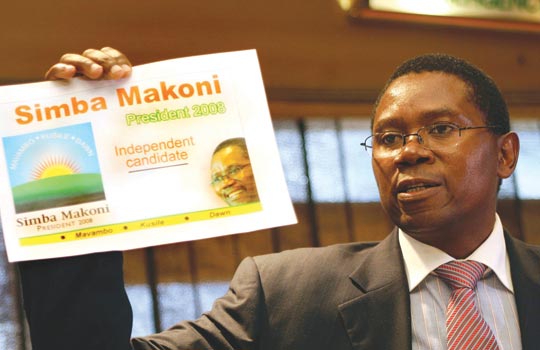
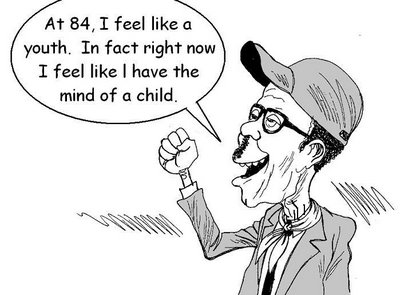

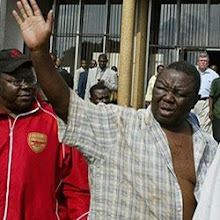

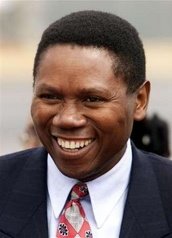

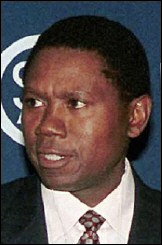


No comments:
Post a Comment